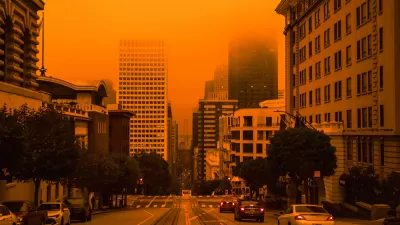The draft of a new report issued last week by the U.S. government concludes the impacts of climate change are spreading faster than previously predicted.
Authored by 240 scientists, business leaders and other experts, the draft of the Third National Climate Assessment [PDF] that was released last week "delivers a bracing picture of environmental changes and natural disasters that mounting scientific evidence indicates is fostered by climate change: heavier rains in the Northeast, Midwest and Plains that have overwhelmed storm drains and led to flooding and erosion; sea level rise that has battered coastal communities; drought that has turned much of the West into a tinderbox," reports .
"Climate change, once considered an issue for a distant future, has moved firmly into the present," the report says. "Americans are noticing changes all around them. Summers are longer and hotter, and periods of extreme heat last longer than any living American has ever experienced. Winters are generally shorter and warmer."
"The findings in the report are a three-alarm fire," said Rep. Henry A. Waxman (D-Beverly Hills). "Climate change is already causing widespread disruption across the nation. We are in deep trouble if we don't act forcefully this year."
Over at The Washington Post's Wonkblog, Brad Plumer shares one of the more striking graphics from the report, which shows projected temperature changes by 2100 under four different scenarios. Under the most extreme (but entirely plausable) scenario, "in which we continue to burn fossil fuels at our current rate with no effort to tackle emissions....average temperatures in the United States rise somewhere between 5°F and 10°F by century’s end (or 2.8°C to 5.5°C)," notes Plumer. "A few parts of the country get up to 15°F hotter. Needless to say, that’s significant."
FULL STORY: Climate assessment delivers a grim overview

Planetizen Federal Action Tracker
A weekly monitor of how Trump’s orders and actions are impacting planners and planning in America.

Congressman Proposes Bill to Rename DC Metro “Trump Train”
The Make Autorail Great Again Act would withhold federal funding to the system until the Washington Metropolitan Area Transit Authority (WMATA), rebrands as the Washington Metropolitan Authority for Greater Access (WMAGA).

The Simple Legislative Tool Transforming Vacant Downtowns
In California, Michigan and Georgia, an easy win is bringing dollars — and delight — back to city centers.

The States Losing Rural Delivery Rooms at an Alarming Pace
In some states, as few as 9% of rural hospitals still deliver babies. As a result, rising pre-term births, no adequate pre-term care and "harrowing" close calls are a growing reality.

The Small South Asian Republic Going all in on EVs
Thanks to one simple policy change less than five years ago, 65% of new cars in this Himalayan country are now electric.

DC Backpedals on Bike Lane Protection, Swaps Barriers for Paint
Citing aesthetic concerns, the city is removing the concrete barriers and flexposts that once separated Arizona Avenue cyclists from motor vehicles.
Urban Design for Planners 1: Software Tools
This six-course series explores essential urban design concepts using open source software and equips planners with the tools they need to participate fully in the urban design process.
Planning for Universal Design
Learn the tools for implementing Universal Design in planning regulations.
Smith Gee Studio
City of Charlotte
City of Camden Redevelopment Agency
City of Astoria
Transportation Research & Education Center (TREC) at Portland State University
US High Speed Rail Association
City of Camden Redevelopment Agency
Municipality of Princeton (NJ)





























